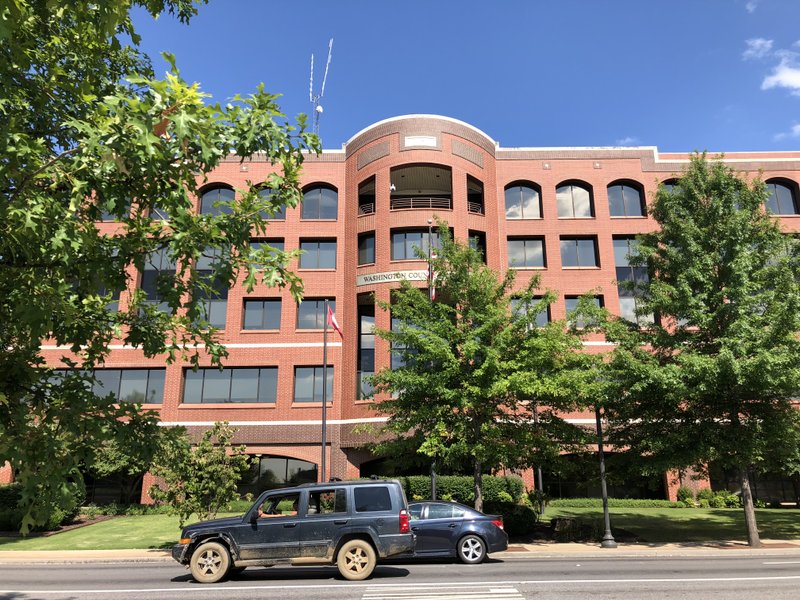FAYETTEVILLE — A lawsuit filed Tuesday claims Washington County officials are continuing to violate the state’s Freedom of Information Act when meeting.
The lawsuit was filed in Washington County Circuit Court by Fort Smith attorneys Joey McCutchen and Stephen Napurano, along with their client Mickey Wayne Wagner.
“The FOIA violations described in the complaint occurred on the heels of several other FOIA violations committed by governing bodies in Washington County,” according to a news release. “In one FOIA lawsuit, Coger v. Washington County, currently on appeal, the county erroneously argues that the open-meeting provisions of FOIA, and by extension the open-records provisions of FOIA, do not extend to county committees or boards.”
The lawsuit contends the Washington Water Authority has violated the open meetings clause of the FOIA by not recording their meetings.
Washington County Judge Patrick Deakins said Tuesday night he had heard of a complaint against the county but had not seen the lawsuit and could not comment on any pending litigation.
Wagner filed a FOIA request Feb. 29 seeking recordings of all board meetings dating back to Jan. 1, 2023, according to the complaint.
Wagner was directed to the Washington Water Authority YouTube channel but found only three board meetings from that time frame were available, according to the lawsuit. The county’s lawyer contacted Wagner on March 18 and told him no additional audio or video recordings exist.
The county has been on notice from rulings in two other previous lawsuits that committees are public bodies and are subject to the public notice and recording provisions of the FOIA, according to the lawsuit.
In an appeal of an earlier ruling, the county argued the open meetings provision of the FOIA, and by extension the open records provision, do not extend to county boards or commissions, according to the lawsuit.
“This argument is profoundly misplaced and is a blatant attempt to undermine the fundamental right of the public to transparency in government affairs,” according to the motion.
The lawsuit contends it’s clear the county has no understanding or intent to follow the state’s open meetings laws.
“Based on the the County’s appeal in Coger V. Joseph Wood, et. al, and it’s repeated failures to comply with the requirements of FOIA, it seems more likely that the county is simply flouting its legal obligations, showing blatant disregard for transparency and the public’s right to know,” the lawsuit states.
The lawsuit asks a judge to declare Washington County violated the FOIA by failing to record Washington Water Authority board meetings and enjoin the county from conducting business outside the public view.
A circuit judge ruled in December 2022 the Washington County Job Evaluation/Salary Administration Program Committee is a public body and its meetings should be public.
However, Special Judge William Randal Wright of Hope declined to sanction Washington County officials, saying there was no evidence to hold them liable for failing to respond to requests for information in a timely manner.
Wright noted the two sides had different ideas about the committee.
“The court finds there’s not a clear understanding in Washington County as to what the JESAP Committee is,” Wright said in ruling from the bench. “This group is a body of elected officials that meet and make recommendations to the Personnel Committee and to the Quorum Court. That’s the very definition of what a public body is.”
Elizabeth Coger, a Washington County resident, community activist and now a justice of the peace for District 9 on the Quorum Court, sued the county, the county judge and other county officials in November 2022 for failure to notify the public of committee meetings and for not complying with records requests she made under the state Freedom of Information Act.
Wright ruled against Coger’s request to hold county officials liable and also denied her request to invalidate any action taken by the committee during the time its meetings were not listed on the county’s monthly calendar of public meetings. He granted her request that the county pay her costs in the lawsuit.
The job committee consists of the county judge, other elected officials and one member of the Quorum Court, according to the testimony of Brian Lester, county attorney and chief of staff for then-County Judge Joseph Wood. As such, the group isn’t a committee of lawmakers and isn’t subject to either the public notice or open meeting provisions of state law, he said. Despite that, the committee’s meetings have been open to the public, he told the judge.

